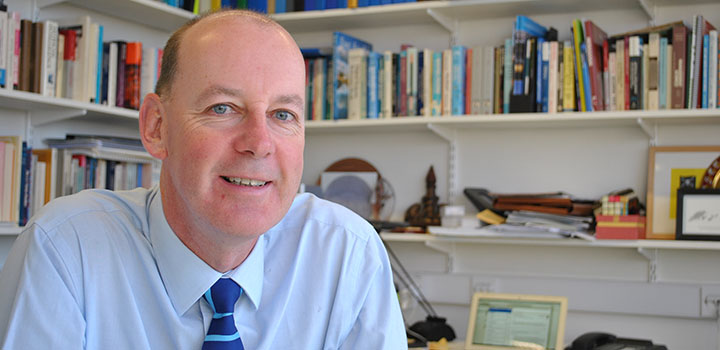A-level students should avoid dangerous skills gap
By: News Archive

An admissions expert from the University of East Anglia (UEA) says A-level exams cancelled due to COVID-19 shouldn’t stop students getting into university, but that they should avoid the ‘dangerous skills gap’ which could see them falling behind when they get there.
A-level students face uncertainty about whether they’ll get the grades to be able to study at universities they’ve already applied to, after it was announced that UK exams over the next couple of months are cancelled due to the pandemic.

Prof Richard Harvey, UEA’s Academic Director of Admissions, said: “We’re not worried about people having the right grades to come study with us, and neither should students. We admit students from over 100 countries around the world and not everyone has a perfect record of grades, we look at so much more than that.
“Besides, I find that grades at A-level don’t always predict how well people do at university. Having those so-called soft skills like being able to take notes in lectures, articulate questions, and use data, are kilometers more important to get on and do well in most degrees.
“My advice is use the time you’re spending at home over the next couple of weeks (or months) to make sure you don’t fall into this dangerous skills gap. Channel your energy into developing the soft skills you could need at university, rather than worrying about your grades and what they’ll mean for you. It’ll put you in much better stead for wherever you end up, and doesn’t hurt if you do go down another path.â€
UEA has a free Massive Online Course (MOOC) for Pre-University Skills, which has already been taken by over 70,000 young people. Revision skills, referencing, analysis and structuring thoughts and ideas are included in the course. Its three hours a week for six weeks online and is for anyone who is considering studying at university.

Dr Harriet Jones, a lecturer in biological sciences at UEA and Pre-University Skills course leader, said: “The few months before exams are always the most crucial at A-level, when learning steps up a gear. Your revision becomes intense, you consolidate your knowledge and continue learning independently, so if students miss out on this period they could be losing out on some of the skills that would help them in higher education.
“Studying at university is very different to school. So many students just turn up to a lecture, listen and leave, for them it is not a learning experience and they can end up struggling. This year’s A-level students will benefit enormously if they take time to do the course and work on these skills, so they can get the most from their experience right from the start.â€
Harriet also working with further education colleges and teachers who have students studying higher education access programmes which prepare people without traditional qualifications for study at university.
Related Articles

Nurses worldwide rely on intuition to triage patients
Nurses around the world use intuition to work out how sick a patient is before triaging for treatment according to new research from the University of East Anglia.
Read more
UEA nursing apprentice’s sky-high dive for Alzheimer's and Dementia awareness
On Sunday 24 September, University of East Anglia (UEA) nursing apprentice Francessca Turrell will be taking part in a charity skydive for Alzheimers Society, a UK care and research charity for people with dementia and their carers.
Read more
New book to focus on Norwich’s medieval logos
Logo Rewind: Trademarks of Medieval Norwich is a new book from UEA Publishing Project, in collaboration with CreativeUEA and featuring the work of Darren Leader, which will focus on the stories of Norwichs medieval merchants marks found in different locat
Read more